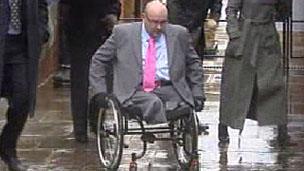7/7 Tube passenger blown out of carriage by bombing
- Published

Daniel Biddle suffered extensive injuries after the bomb in his Tube carriage was detonated
A survivor of the 7 July blast at Edgware Road Tube station has told how he was standing next to the plot ringleader when he detonated his bomb.
Daniel Biddle, 31, was blown from the carriage and lost both legs, his left eye, his spleen and pints of blood.
He told the inquest into the 2005 attacks he saw the bomber's arm move quickly and then a "big, white flash".
Mohammad Sidique Khan killed himself and six other people when he detonated the device on the Circle Line train.
Mr Biddle also said a 20p piece remained lodged in his thigh bone, and that other shrapnel, including his door keys, was removed by surgeons.
Mr Biddle described how Khan, who got on the westbound train at King's Cross, sat between 6ft and 10ft away from him before detonating his bomb by pulling a white cord.
Attending the Royal Courts of Justice for the inquest, Mr Biddle said: "The train entered the Tube tunnel, I looked around.
"As I looked around, he looked up and I saw a quick movement. Then there was a big, white flash.
"The kind of noise you get when you tune a radio in. It felt like the carriage I was in expanded at a fast rate and then contracted quickly.
"And with that it blew me off my feet and through the carriage doors into the tunnel."
He also said that Khan "looked up and along the carriage and just looked down" before he set the device off.
"He didn't say anything or shout anything I remember hearing. He got his head down, moved his arm and the next thing I am outside the train."
'If only'
Mr Biddle, a construction manager, was taken to St Mary's Hospital in Paddington and the inquest heard how his heart was massaged by hand as medical staff fought to save his life.
He spent several weeks in a coma and needed dozens of pints of blood in transfusions.
Earlier, the inquest heard how he had caught that particular Tube train because he was running late after waking with a migraine.
He let the first train to arrive at Liverpool Street pass because it was so crowded and then missed his stop at Baker Street because he was sending a text message.
"People were getting on and off. I didn't really pay particular attention to anybody," he said. "I saw a young Asian guy get on King's Cross and sort of walk along the carriage and sit down, but I didn't really think anything of it.
"There was nothing about him that made me think he was a danger."
Coroner Lady Justice Hallett said the words "if only" must resonate in the minds of many of the survivors and their families.
She told Mr Biddle: "Given the large number of factors that combined to put you on that train, I pray they do not haunt you.
"You have suffered so much and your survival is inspirational."
'Very basic'
The inquest heard from a passenger on the train who helped save Mr Biddle's life.
Adrian Heili, who served in Kosovo and is a trained first aider, said choosing who to help was the "hardest" decision of his life.
He heard Mr Biddle's screams and clambered under the train to reach him on the tunnel floor.
Mr Biddle was trapped under a carriage door and upon lifting the sheet of metal, Mr Heili realised he was missing a leg and set to work making tourniquets from his belt and shirt.
Mr Heili, from South Africa, requested medical supplies but told the inquest he was given a "very basic" first aid kit.
He waited with Mr Biddle until he was taken away in an ambulance and returned to the wrecked carriage to help other injured survivors. He was in the last group of people to leave the train.
Coroner Lady Justice Hallett said his fellow passengers were "extremely fortunate" to have him there on that day.
"I can't believe the brave Mr Biddle would have survived his horrific injuries but for your intervention," she said.
The inquests into the deaths of the 52 victims got under way in October, and this session was the first to specifically focus on the Edgware Road Tube bombing.
It began with relations of Khan's victims reading statements about their lives and the type of people they were.
Katy Brewster talked about her father Michael, Veronica Downey spoke of her husband Jonathan, Graham Foulkes described his son David, and Ros Morley talked of her husband Colin.
Statements were also read out on behalf of Julie Nicholson who lost her daughter Jennifer, and Hazel Webb, who lost her daughter Laura.